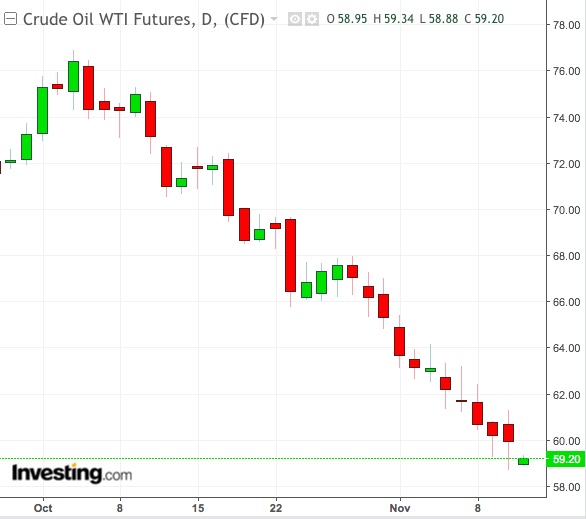US President Donald Trump didn't wait long to serve up his latest twitter volley after Saudi Arabia, the world's largest oil exporter, announced at the weekend that it planned to cut half a million barrels of its oil supply beginning in December.
Before the first trading session of the week began, after the announcement was released, Trump tweeted:
“Hopefully, Saudi Arabia and OPEC will not be cutting oil production. Oil prices should be much lower based on supply!”
And the market promptly ended down for an 11th straight day on Monday, wiping out gains built earlier in Asian and European trading. Some of the industry’s most-watched analysts couldn’t hide their surprise on Monday on who had become the newest friend to oil bears: Donald Trump.
London-based Energy Aspects, known for its incisive market insights on oil, devoted a five-page note to how the president and his administration misled Saudi Arabia and the Organization of the Petroleum Exporting Countries (OPEC) into thinking the world was going to suffer one of its worst supply squeezes due to sanctions on Iran.
Lower Oil Prices Mattered More Than 'Punishing' Iran
The ploy was key in motivating OPEC’s other major producers, Saudi Arabia included, to boost production in recent months over the Iranian fear factor—when what Trump wanted were ample crude supplies so that he could keep US pump prices for gasoline low while scoring political points against Tehran to appease his conservative base of voters ahead of the November 6 midterm elections.
This was clear when a day before the Iran sanctions kicked in on November 5, his administration announced unexpected waivers for eight major buyers of Iranian oil to continue importing from Tehran for another six months. Quotas for some of the waivers were not disclosed, adding to the deception.
“The oil bulls are angry and dejected, and dare we say rightly so,” Energy Aspects said in the note entitled ‘Broken Trust’.
The research group added:
“Having vowed to bring Iranian exports to zero, Donald Trump caved and issued waivers to import Iranian oil to eight countries. We calculate waivers will amount to just above 1.3 million barrels per day (bpd) of Iranian crude and condensate exports, but with the US refusing to confirm waiver volumes, the market is assuming the worst, with some talking of exports of up to 2 million bpd again.”
OPEC Group Feeling Misled By Trump
Phil Flynn of Chicago’s Price Futures Group, another prominent commentator on oil, said OPEC was also “angry that President Donald Trump misled them, and with Iran telling the Saudis ‘I told you so’".
Flynn said the cartel would now have to defy Trump and “stop the bear bath, (or) stand to lose more billions than they already have during this selloff”.

US West Texas Intermediate crude has already lost nearly 25 percent of its value in the past six weeks while UK Brent, the global benchmark for oil, has fallen by more than 20 percent on worries of oversupply following Trump’s maneuvers on Iran.
Before Trump announced in May that he would be applying sanctions to bring Iranian sales to zero, Tehran’s exports peaked at 2.5 million bpd in April. Then as oil prices began rallying, the President asked OPEC and its main ally Russia to start pumping more. Wary of the 2014-2017 oil glut that they had just resolved by cutting supply, producers initially resisted his overtures. But Trump refused to back down, accusing OPEC of “ripping off the rest of the world” with high oil prices.
US Shale Oil Output The Real Shocker
Energy Aspects estimates that while OPEC exports had risen somewhat on pressure from Trump in recent months, what really threw the market off the rails was the unexpected surge in US shale oil production to record highs of 11.6 million bpd.
Bank of America Merrill Lynch said in a note on Monday:
“The next OPEC price war could end up proving to be a lot more costly to the cartel, just as the US has continued to isolate itself from global oil price swings. In just 10 years, America flipped from being a huge importer to become the largest exporter of petroleum products in the world. On average, we estimate that US petroleum product exports averaged 5.1 million bpd in the past quarter mostly on a combination of gasoline, diesel and residual fuel.”
Washington, meanwhile, continues to claim that its ultimate goal is to reduce Iranian oil exports to zero, but Energy Aspects said:
“The fact that the Administration handed out waivers like leftover Halloween candy makes it difficult for the market, including us, to believe them again.”
Forecasting 'Next To Impossible' With Trump
Amid the perception that the US was no longer looking to inflict maximum pain on Iran, refiners are reluctant to load up on crude, sensing that buyers of Iranian oil could cheat by continuing with purchases after the end of the 180-day waivers or even breach existing import quotas.
Although the Saudis plan a 500,000 bpd supply cut from next month and OPEC and Russia could take an equal volume or more off at a scheduled meeting on December 6, battered market sentiment cannot be restored overnight, said Energy Aspects, adding:
“This will take at least a month. So, we have reduced our Brent price forecast for Q4 18 by $8 to $79 per barrel and with the Trump administration showing its clear preference for low oil prices, we have also lowered our 2019 forecast by $7 to $85.”
The research agency said it remained concerned about the 2019 macro picture, and with petrochemical margins falling sharply as end-users in Asia aggressively de-stock, fearing an escalation of the US-China trade war, there was possible downside risk to its forecasts. It added:
“Forecasting is always difficult, but Trump has made it next to impossible to carry it out with any sense of confidence.”
